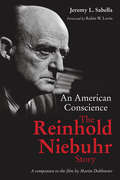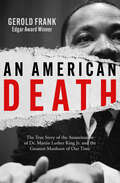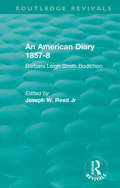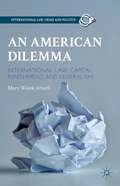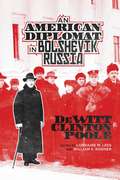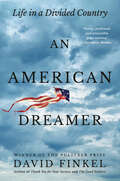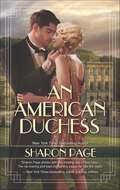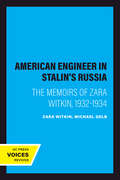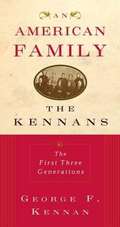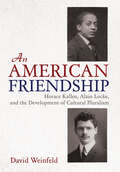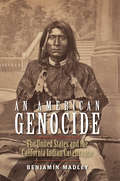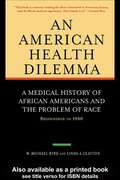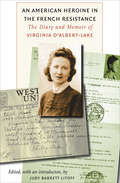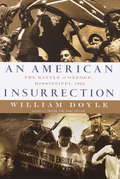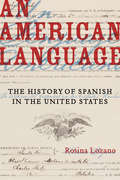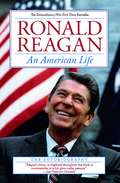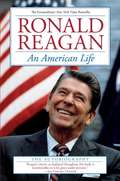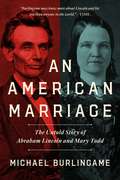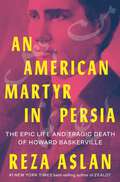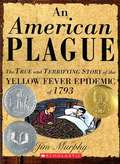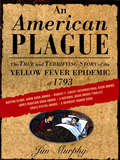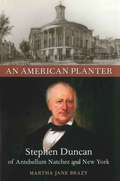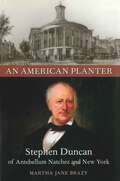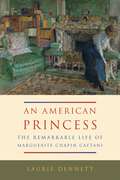- Table View
- List View
An American Conscience: The Reinhold Niebuhr Story
by Jeremy L. SabellaReinhold Niebuhr (1892–1971) was an inner-city pastor, ethics professor, and author of the famous Serenity Prayer. Time magazine's 25th anniversary issue in March 1948 featured Niebuhr on its cover, and Time later eulogized him as "the greatest Protestant theologian in America since Jonathan Edwards." Cited as an influence by public figures ranging from Billy Graham to Barack Obama, Niebuhr was described by historian Arthur Schlesinger Jr. as "the most influential American theologian of the twentieth century." In this companion volume to the forthcoming documentary film by Martin Doblmeier on the life and influence of Reinhold Niebuhr, Jeremy Sabella draws on an unprecedented set of exclusive interviews to explore how Niebuhr continues to compel minds and stir consciences in the twenty-first century. Interviews with leading voices such as Jimmy Carter, David Brooks, Cornel West, and Stanley Hauerwas as well as with people who knew Niebuhr personally, including his daughter Elisabeth, provide a rich trove of original material to help readers understand Niebuhr's enduring impact on American life and thought.CONTRIBUTORS (interviewees) Andrew J. Bacevich David Brooks Lisa Sowle Cahill Jimmy Carter Gary Dorrien Andrew Finstuen K. Healan Gaston Stanley Hauerwas Susannah Heschel William H. Hudnut III Robin W. Lovin Fr. Mark S. Massa, SJ Elisabeth Sifton Ronald H. Stone Cornel West Andrew Young
An American Death: The True Story of the Assassination of Dr. Martin Luther King Jr. and the Greatest Manhunt of Our Time
by Gerold FrankNew York Times–Bestselling Author: &“Frank&’s reconstruction of Dr. [Martin Luther] King&’s murder and its aftermath is remarkably convincing.&” —The New York Times Written by two-time Edgar Award winner Gerold Frank, An American Death examines the infamous 1968 assassination of the legendary civil rights leader in Memphis, Tennessee, in vivid, extensive detail. Frank casts a light on historical truth and builds a coherent narrative of events amid the chaos and conspiracy theories that surround Dr. King&’s murder. The author recounts the details of April 4, and delves into the shocking events leading up to the fateful day, including James Earl Ray&’s background and escape from prison, and the manhunt and quest for justice that followed the killing, in this riveting account of a crime that shook a nation. &“Provide[s] insight into James Earl Ray and the rather squalid world from which he emerged . . . persuasively argued.&” —Worldview &“Frank&’s picture of Ray . . . is remarkable.&” —TimeIncludes photographs
An American Diary 1857-8: Barbara Leigh Smith Bodichon (Routledge Revivals)
by Joseph W. Reed Jr‘I am one of the cracked people of the world,’ Barbara Leigh Smith Bodichon wrote of herself, ‘and I like to herd with the cracked … queer Americans, democrats, socialists, artists, poor devils or angels; and am never happy in an English genteel family life. I try to do it like other people, but I long always to be off on some wild adventure.’ Reformer, feminist, free-thinker, later to endow the founding of Girton College, Barbara Bodichon went to the United States on a marriage journey. First published in 1972, her journal of that trip, published in its original form for the first time, contains timely observation and incisive criticism of the American South before the Civil War, and gives a vivid portrait of a lively woman of her times, the friend of George Eliot and other leading figures of her age. This edition includes a fascinating introduction about the English visitor in the United States, from Dickens to Trollope. There is also a biographical study of Barbara Bodichon herself, giving an account of her life and of the causes, notably Women’s Rights, to which she devoted her time and energy.
An American Dilemma
by Mary Welek AtwellAn American Dilemma examines the issue of capital punishment in the United States as it conflicts with the nation's obligations under the 1963 Vienna Convention on Consular Relations. In a number of high profile cases, foreign nationals have been executed after being denied their rights under the Vienna Convention. The International Court of Justice has ruled against the United States, but individual states have chosen to defy international law. The Supreme Court has not resolved the question of legal remedies for such breaches.
An American Diplomat in Bolshevik Russia
by Dewitt Clinton PooleDiplomat DeWitt Clinton Poole arrived for a new job at the United States consulate office in Moscow in September 1917, just two months before the Bolshevik Revolution. In the final year of World War I, as Russians were withdrawing and Americans were joining the war, Poole found himself in the midst of political turmoil in Russia. U. S. relations with the newly declared Soviet Union rapidly deteriorated as civil war erupted and as Allied forces intervened in northern Russia and Siberia. Thirty-five years later, in the climate of the Cold War, Poole recounted his experiences as a witness to that era in a series of interviews. Historians Lorraine M. Lees and William S. Rodner introduce and annotate Poole's recollections, which give a fresh, firsthand perspective on monumental events in world history and reveal the important impact DeWitt Clinton Poole (1885#150;1952) had on U. S. #150;Soviet relations. He was active in implementing U. S. policy, negotiating with the Bolshevik authorities, and supervising American intelligence operations that gathered information about conditions throughout Russia, especially monitoring anti-Bolshevik elements and areas of German influence. Departing Moscow in late 1918 via Petrograd, he was assigned to the port of Archangel, then occupied by Allied and American forces, and left Russia in June 1919.
An American Dreamer: Life in a Divided Country
by David FinkelA man navigates the deep divisions in America today and discovers that sometimes change can start by finding common ground with your neighbors in this immersive account by the Pulitzer Prize–winning author of Thank You for Your Service and The Good Soldiers.&“Finkel&’s account is poetic, profound, and irresistibly page-turning.&”—Geraldine Brooks, author of HorseAs this powerful book begins, Brent Cummings finds himself coping with the feeling that the country he loves is fracturing in front of his eyes. An Iraq war veteran, raised to believe in a vision of America that values fairness, honesty, and respect for others, Cummings is increasingly surprised by the behavior and beliefs of others, and engulfed by the fear, anger, and confusion that is sweeping through his beloved country as he tries to hold on to his values and his hope for America&’s future.David Finkel, known for his unique, in-depth reporting, spent fourteen years deep inside Brent Cummings&’s world to create this intimate and vivid portrait of a man&’s life, his work, family, community, his thoughts, and his quest for connection, as America becomes ever more divided. Cummings was one of the unforgettable figures in Finkel&’s The Good Soldiers, a book about which The New York Times stated, &“Finkel has made art out of a defining moment in history. You will be able to take this book down from the shelf years from now, and say: This is what happened. This is what it felt like.&”An American Dreamer illuminates, with the deepest empathy, the feelings and lives of many people in America today, and it is a brilliant chronicle of one person&’s everyday experiences of frustration, confusion, and hope.
An American Duchess
by Sharon PageAt the height of the Roaring Twenties, New York heiress Zoe Gifford longs for the freedoms promised by the Jazz Age. Headstrong and brazen, but bound by her father's will to marry before she can access his fortune, Zoe arranges for a brief marriage to Sebastian Hazelton, whose aristocratic British family sorely needs a benefactor. Once in England, her foolproof plan to wed, inherit and divorce proves more complicated than Zoe had anticipated. Nigel Hazelton, Duke of Langford and Sebastian's austere older brother, is disgraced by the arrangement and looks down upon the raucous young American who has taken up residence at crumbling Brideswell Abbey. Still reeling from the Great War, Nigel is now staging a one-man battle against a rapidly changing world-and the outspoken Zoe represents everything he's fighting against. When circumstances compel Zoe to marry Nigel rather than Sebastian, she does so for love, he for honor. But with Nigel unwilling to change with the times, Zoe may be forced to choose between her husband and her dreams.
An American Engineer in Stalin's Russia: The Memoirs of Zara Witkin, 1932-1934
by Zara WitkinIn 1932 Zara Witkin, a prominent American engineer, set off for the Soviet Union with two goals: to help build a society more just and rational than the bankrupt capitalist system at home, and to seek out the beautiful film star Emma Tsesarskaia.His memoirs offer a detailed view of Stalin's bureaucracy—entrenched planners who snubbed new methods; construction bosses whose cover-ups led to terrible disasters; engineers who plagiarized Witkin's work; workers whose pride was defeated. Punctuating this document is the tale of Witkin's passion for Tsesarskaia and the record of his friendships with journalist Eugene Lyons, planner Ernst May, and others.Witkin felt beaten in the end by the lethargy and corruption choking the greatest social experiment in history, and by a pervasive evil—the suppression of human rights and dignity by a relentless dictatorship. Finally breaking his spirit was the dissolution of his romance with Emma, his "Dark Goddess."In his lively introduction, Michael Gelb provides the historical context of Witkin's experience, details of his personal life, and insights offered by Emma Tsesarskaia in an interview in 1989.
An American Family: The Kennans, The First Three Generations
by George F. KennanPulitzer Prize-winning author and former statesman George F. Kennan traces his roots back more than five generations, discovering in the process a family history with all the makings of a classic American story.
An American Friendship: Horace Kallen, Alain Locke, and the Development of Cultural Pluralism
by David WeinfeldIn An American Friendship, David Weinfeld presents the biography of an idea, cultural pluralism, the intellectual precursor to modern multiculturalism. He roots its origins in the friendship between two philosophers, Jewish immigrant Horace Kallen and African American Alain Locke, who advanced cultural pluralism in opposition to both racist nativism and the assimilationist "melting pot." It is a simple idea—different ethnic groups can and should coexist in the United States, perpetuating their cultures for the betterment of the country as whole—and it grew out of the lived experience of this friendship between two remarkable individuals. Kallen, a founding faculty member of the New School for Social Research, became a leading American Zionist. Locke, the first Black Rhodes Scholar, taught at Howard University and is best known as the intellectual godfather of the Harlem Renaissance and the editor of The New Negro in 1925. Their friendship began at Harvard and Oxford during the years 1906 through 1908 and was rekindled during the Great Depression, growing stronger until Locke's death in 1954. To Locke and Kallen, friendship itself was a metaphor for cultural pluralism, exemplified by people who found common ground while appreciating each other's differences. Weinfeld demonstrates how this understanding of cultural pluralism offers a new vision for diverse societies across the globe. An American Friendship provides critical background for understanding the conflicts over identity politics that polarize US society today.
An American Genocide: The United States and the California Indian Catastrophe, 1846-1873
by Benjamin MadleyBetween 1846 and 1873, California's Indian population plunged from perhaps 150,000 to 30,000. Benjamin Madley is the first historian to uncover the full extent of the slaughter, the involvement of state and federal officials, the taxpayer dollars that supported the violence, indigenous resistance, who did the killing, and why the killings ended. This deeply researched book is a comprehensive and chilling history of an American genocide. Madley describes pre-contact California and precursors to the genocide before explaining how the Gold Rush stirred vigilante violence against California Indians. He narrates the rise of a state-sanctioned killing machine and the broad societal, judicial, and political support for genocide. Many participated: vigilantes, volunteer state militiamen, U. S. Army soldiers, U. S. congressmen, California governors, and others. The state and federal governments spent at least $1,700,000 on campaigns against California Indians. Besides evaluating government officials' culpability, Madley considers why the slaughter constituted genocide and how other possible genocides within and beyond the Americas might be investigated using the methods presented in this groundbreaking book.
An American Health Dilemma: A Medical History of African Americans and the Problem of Race: Beginnings to 1900
by W. Michael Byrd Linda A. ClaytonAt times mirroring and at times shockingly disparate to the rise of traditional white American medicine, the history of African-American health care is a story of traditional healers; root doctors; granny midwives; underappreciated and overworked African-American physicians; scrupulous and unscrupulous white doctors and scientists; governmental support and neglect; epidemics; and poverty. Virtually every part of this story revolves around race. More than 50 years after the publication of An American Dilemma, Gunnar Myrdal's 1944 classic about race relations in the USA, An American Health Dilemma presents a comprehensive and groundbreaking history and social analysis of race, race relations and the African-American medical and public health experience. Beginning with the origins of western medicine and science in Egypt, Greece and Rome the authors explore the relationship between race, medicine, and health care from the precursors of American science and medicine through the days of the slave trade with the harrowing middle passage and equally deadly breaking-in period through the Civil War and the gains of reconstruction and the reversals caused by Jim Crow laws. It offers an extensive examination of the history of intellectual and scientific racism that evolved to give sanction to the mistreatment, medical abuse, and neglect of African Americans and other non-white people. Also included are biographical portraits of black medical pioneers like James McCune Smith, the first African American to earn a degree from a European university, and anecdotal vignettes,like the tragic story of "the Hottentot Venus", which illustrate larger themes.An American Health Dilemma promises to become an irreplaceable and essential look at African-American and medical history and will provide an invaluable baseline for future exploration of race and racism in the American health system.
An American Heroine in the French Resistance: The Diary and Memoir of Virginia D'Albert-Lake (World War Ii: The Global, Human, And Ethical Dimension Ser. #Vol. 9)
by Virginia D'Albert-LakeThis account by a woman who fought the Nazis alongside her husband is &“an indelible portrait of extraordinary strength of character&” (The New Yorker). Virginia Roush fell in love with Philippe d&’Albert-Lake during a visit to France in 1936; they married soon after. In 1943, they both joined the Resistance, where Virginia put her life in jeopardy as she sheltered downed airmen and later survived a Nazi prison camp. After the war, she stayed in France with Philippe, and was awarded the Légion d&’Honneur and the Medal of Honor. This book includes two rare documents—Virginia&’s diary of wartime France until her capture in 1944, and her prison memoir written immediately after the war. Together they offer &“an invaluable record of the workings of the French Resistance by one of the very few American women who participated in it&” (Providence Journal). &“A sharply etched and moving story of love, companionship, commitment, and sacrifice . . . This beautifully edited diary and memoir throw an original light on the French Resistance.&” —Robert Gildea, author of Marianne in Chains: In Search of the German Occupation, 1940–1945 &“At once a stunning self-portrait and dramatic narrative of a valorous young American woman . . . an exciting and gripping story.&” —Walter Cronkite
An American Iliad: The Story of the Civil War
by Charles P. RolandThis comprehensive history of the Civil War interweaves the story of battles and campaigns with accounts of the major political, diplomatic, social, and cultural events of the epoch and insightful sketches of the leading actors. The story of the Civil War is the epic of the American people.
An American Insurrection: James Meredith and the Battle of Oxford, Mississippi, 1962
by William DoyleIn 1961, a black veteran named James Meredith applied for admission to the University of Mississippi -- and launched a legal revolt against white supremacy in the most segregated state in America. Meredith's challenge ultimately triggered what Time magazine called "the gravest conflict between federal and state authority since the Civil War," a crisis that on September 30, 1962, exploded into a chaotic battle between thousands of white civilians and a small corps of federal marshals. To crush the insurrection, President John F. Kennedy ordered a lightning invasion of Mississippi by over 20,000 U.S. combat infantry, paratroopers, military police, and National Guard troops. Based on years of intensive research, including over 500 interviews, JFK's White House tapes, and 9,000 pages of FBI files, An American Insurrection is a minute-by-minute account of the crisis. William Doyle offers intimate portraits of the key players, from James Meredith to the segregationist Mississippi Governor Ross Barnett, to President John F. Kennedy and the federal marshals and soldiers who risked their lives to uphold the Constitution. The defeat of the segregationist uprising in Oxford was a turning point in the civil rights struggle, and An American Insurrection brings this largely forgotten event to life in all its drama, stunning detail, and historical importance.
An American Language: The History of Spanish in the United States (American Crossroads #49)
by Rosina LozanoAn American Language is a tour de force that revolutionizes our understanding of U.S. history. It reveals the origins of Spanish as a language binding residents of the Southwest to the politics and culture of an expanding nation in the 1840s. As the West increasingly integrated into the United States over the following century, struggles over power, identity, and citizenship transformed the place of the Spanish language in the nation. An American Language is a history that reimagines what it means to be an American—with profound implications for our own time.
An American Life
by Ronald ReaganRonald Reagan's autobiography is a work of major historical importance. Here, in his own words, is the story of his life--public and private--told in a book both frank and compellingly readable. Few presidents have accomplished more, or been so effective in changing the direction of government in ways that are both fundamental and lasting, than Ronald Reagan. Certainly no president has more dramatically raised the American spirit, or done so much to restore national strength and self-confidence. Here, then, is a truly American success story--a great and inspiring one. From modest beginnings as the son of a shoe salesman in Tampico, Illinois, Ronald Reagan achieved first a distinguished career in Hollywood and then, as governor of California and as president of the most powerful nation in the world, a career of public service unique in our history. Ronald Reagan's account of that rise is told here with all the uncompromising candor, modesty, and wit that made him perhaps the most able communicator ever to occupy the White House, and also with the sense of drama of a gifted natural storyteller. He tells us, with warmth and pride, of his early years and of the elements that made him, in later life, a leader of such stubborn integrity, courage, and clear-minded optimism. Reading the account of this childhood, we understand how his parents, struggling to make ends meet despite family problems and the rigors of the Depression, shaped his belief in the virtues of American life--the need to help others, the desire to get ahead and to get things done, the deep trust in the basic goodness, values, and sense of justice of the American people--virtues that few presidents have expressed more eloquently than Ronald Reagan. With absolute authority and a keen eye for the details and the anecdotes that humanize history, Ronald Reagan takes the reader behind the scenes of his extraordinary career, from his first political experiences as president of the Screen Actors Guild (including his first meeting with a beautiful young actress who was later to become Nancy Reagan) to such high points of his presidency as the November 1985 Geneva meeting with Mikhail Gorbachev, during which Reagan invited the Soviet leader outside for a breath of fresh air and then took him off for a walk and a man-to-man chat, without aides, that set the course for arms reduction and charted the end of the Cold War. Here he reveals what went on behind his decision to enter politics and run for the governorship of California, the speech nominating Barry Goldwater that first made Reagan a national political figure, his race for the presidency, his relations with the members of his own cabinet, and his frustrations with Congress. He gives us the details of the great themes and dramatic crises of his eight years in office, from Lebanon to Grenada, from the struggle to achieve arms control to tax reform, from Iran-Contra to the visits abroad that did so much to reestablish the United States in the eyes of the world as a friendly and peaceful power. His narrative is full of insights, from the unseen dangers of Gorbachev's first visit to the United States to Reagan's own personal correspondence with major foreign leaders, as well as his innermost feelings about life in the White House, the assassination attempt, his family--and the enduring love between himself and Mrs. Reagan. An American Life is a warm, richly detailed, and deeply human book, a brilliant self-portrait, a significant work of history.
An American Life: An Enhanced eBook with CBS Video
by Ronald ReaganRonald Reagan's autobiography is a work of major historical importance. Here, in his own words, is the story of his life--public and private--told in a book both frank and compellingly readable. Few presidents have accomplished more, or been so effective in changing the direction of government in ways that are both fundamental and lasting, than Ronald Reagan. Certainly no president has more dramatically raised the American spirit, or done so much to restore national strength and self-confidence. Here, then, is a truly American success story--a great and inspiring one. From modest beginnings as the son of a shoe salesman in Tampico, Illinois, Ronald Reagan achieved first a distinguished career in Hollywood and then, as governor of California and as president of the most powerful nation in the world, a career of public service unique in our history. Ronald Reagan's account of that rise is told here with all the uncompromising candor, modesty, and wit that made him perhaps the most able communicator ever to occupy the White House, and also with the sense of drama of a gifted natural storyteller. He tells us, with warmth and pride, of his early years and of the elements that made him, in later life, a leader of such stubborn integrity, courage, and clear-minded optimism. Reading the account of this childhood, we understand how his parents, struggling to make ends meet despite family problems and the rigors of the Depression, shaped his belief in the virtues of American life--the need to help others, the desire to get ahead and to get things done, the deep trust in the basic goodness, values, and sense of justice of the American people--virtues that few presidents have expressed more eloquently than Ronald Reagan. With absolute authority and a keen eye for the details and the anecdotes that humanize history, Ronald Reagan takes the reader behind the scenes of his extraordinary career, from his first political experiences as president of the Screen Actors Guild (including his first meeting with a beautiful young actress who was later to become Nancy Reagan) to such high points of his presidency as the November 1985 Geneva meeting with Mikhail Gorbachev, during which Reagan invited the Soviet leader outside for a breath of fresh air and then took him off for a walk and a man-to-man chat, without aides, that set the course for arms reduction and charted the end of the Cold War. Here he reveals what went on behind his decision to enter politics and run for the governorship of California, the speech nominating Barry Goldwater that first made Reagan a national political figure, his race for the presidency, his relations with the members of his own cabinet, and his frustrations with Congress. He gives us the details of the great themes and dramatic crises of his eight years in office, from Lebanon to Grenada, from the struggle to achieve arms control to tax reform, from Iran-Contra to the visits abroad that did so much to reestablish the United States in the eyes of the world as a friendly and peaceful power. His narrative is full of insights, from the unseen dangers of Gorbachev's first visit to the United States to Reagan's own personal correspondence with major foreign leaders, as well as his innermost feelings about life in the White House, the assassination attempt, his family--and the enduring love between himself and Mrs. Reagan. An American Life is a warm, richly detailed, and deeply human book, a brilliant self-portrait, a significant work of history.
An American Marriage: The Untold Story of Abraham Lincoln and Mary Todd
by Michael BurlingameAn enlightening narrative exploring an oft-overlooked aspect of the sixteenth president's life, An American Marriage reveals the tragic story of Abraham Lincoln&’s marriage to Mary Todd.Abraham Lincoln was apparently one of those men who regarded &“connubial bliss&” as an untenable fantasy. During the Civil War, he pardoned a Union soldier who had deserted the army to return home to wed his sweetheart. As the president signed a document sparing the soldier's life, Lincoln said: &“I want to punish the young man—probably in less than a year he will wish I had withheld the pardon.&” Based on thirty years of research, An American Marriage describes and analyzes why Lincoln had good reason to regret his marriage to Mary Todd. This revealing narrative shows that, as First Lady, Mary Lincoln accepted bribes and kickbacks, sold permits and pardons, engaged in extortion, and peddled influence. The reader comes to learn that Lincoln wed Mary Todd because, in all likelihood, she seduced him and then insisted that he protect her honor. Perhaps surprisingly, the 5&’2&” Mrs. Lincoln often physically abused her 6&’4&” husband, as well as her children and servants; she humiliated her husband in public; she caused him, as president, to fear that she would disgrace him publicly. Unlike her husband, she was not profoundly opposed to slavery and hardly qualifies as the &“ardent abolitionist&” that some historians have portrayed. While she providid a useful stimulus to his ambition, she often &“crushed his spirit,&” as his law partner put it. In the end, Lincoln may not have had as successful a presidency as he did—where he showed a preternatural ability to deal with difficult people—if he had not had so much practice at home.
An American Martyr in Persia: The Epic Life And Tragic Death Of Howard Baskerville
by Reza AslanIn this erudite and piercing biography, best-selling author Reza Aslan proves that one person’s actions can have revolutionary consequences that reverberate the world over. Little known in America but venerated as a martyr in Iran, Howard Baskerville was a twenty-two-year-old Christian missionary from South Dakota who traveled to Persia (modern-day Iran) in 1907 for a two-year stint teaching English and preaching the gospel. He arrived in the midst of a democratic revolution—the first of its kind in the Middle East—led by a group of brilliant young firebrands committed to transforming their country into a fully self-determining, constitutional monarchy, one with free elections and an independent parliament. The Persian students Baskerville educated in English in turn educated him about their struggle for democracy, ultimately inspiring him to leave his teaching post and join them in their fight against a tyrannical shah and his British and Russian backers. “The only difference between me and these people is the place of my birth," Baskerville declared, “and that is not a big difference.” In 1909, Baskerville was killed in battle alongside his students, but his martyrdom spurred on the revolutionaries who succeeded in removing the shah from power, signing a new constitution, and rebuilding parliament in Tehran. To this day, Baskerville’s tomb in the city of Tabriz remains a place of pilgrimage. Every year, thousands of Iranians visit his grave to honor the American who gave his life for Iran. In this rip-roaring tale of his life and death, Aslan gives us a powerful parable about the universal ideals of democracy—and to what degree Americans are willing to support those ideals in a foreign land. Woven throughout is an essential history of the nation we now know as Iran—frequently demonized and misunderstood in the West. Indeed, Baskerville’s life and death represent a “road not taken” in Iran. Baskerville’s story, like his life, is at the center of a whirlwind in which Americans must ask themselves: How seriously do we take our ideals of constitutional democracy and whose freedom do we support?
An American Plague: The True and Terrifying Story of the Yellow Fever Epidemic of 1793
by Jim MurphyNIMAC-sourced textbook <P><P>The true and terrifying story of the Yellow Fever Epidemic of 1793.
An American Plague: The True and Terrifying Story of the Yellow Fever Epidemic of 1793
by Jim MurphyNational Book Award Finalist: An account of the disease that ravaged eighteenth-century Philadelphia, written and illustrated for young readers. 1793, Philadelphia: The nation&’s capital and the largest city in North America is devastated by an apparently incurable disease, cause unknown… This dramatic narrative describes the illness known as yellow fever and the toll it took on the city&’s residents, relating the epidemic to the social and political events of the day and eighteenth-century medical beliefs and practices. Drawing on first-hand accounts, Jim Murphy spotlights the heroic role of Philadelphia&’s free blacks in combating the disease, and the Constitutional crisis President Washington faced when he was forced to leave the city—and all his papers—to escape the deadly contagion. The search for the fever's causes and cure provides a suspenseful counterpoint to this riveting true story of a city under siege. Winner of multiple awards, this thoroughly researched book offers a look at the conditions of cities at the time of our nation&’s birth, and draws timely parallels to modern-day epidemics. &“A lavishly illustrated book, containing maps, newspaper columns and period illustrations…unflinchingly presents the horrors of the event as well as its heroes.&”—The New York Times &“Pair this work with Laurie Halse Anderson&’s wonderful novel Fever 1793 and you&’ll have students hooked on history.&”—School Library Journal &“History, science, politics, and public health come together in this dramatic account of the disastrous yellow fever epidemic that hit the nation&’s capital more than 200 years ago.&”—Booklist
An American Planter: Stephen Duncan of Antebellum Natchez and New York (Southern Biography Series)
by Martha Jane BrazyExtraordinarily wealthy and influential, Stephen Duncan (1787-1867) was a landowner, slaveholder, and financier with a remarkable array of social, economic, and political contacts in pre-Civil War America. In this, the first biography of Duncan, Martha Jane Brazy offers a compelling new portrait of antebellum life through exploration of Duncan's multifaceted personal networks in both the South and the North. Duncan grew up in an elite Pennsylvania family with strong business ties in Philadelphia. There was little indication, though, that he would become a cosmopolitan entrepreneur who would own over fifteen plantations in Mississippi and Louisiana, collectively owning more than two thousand slaves. With style and substance, Martha Jane Brazy describes both the development of Duncan's businesses and the lives of the slaves on whose labor his empire was constructed. According to Brazy, Duncan was a hybrid, not fully a southerner or a northerner. He was also, Brazy shows, a paradox. Although he put down deep roots in Natchez, his sphere of influence was national in scope. Although his wealth was greatly dependent on the slaves he owned, he predicted a clash over the issue of slave ownership nearly three decades before the onset of the Civil War. Perhaps more than any other planter studied, Duncan contradicts historians' definition of the southern slaveholding aristocracy. By connecting and contrasting the networks of this elite planter and those he enslaved, Brazy provides new insights into the slaveocracy of antebellum America.
An American Planter: Stephen Duncan of Antebellum Natchez and New York (Southern Biography Series)
by Martha Jane BrazyExtraordinarily wealthy and influential, Stephen Duncan (1787–1867) was a landowner, slaveholder, and financier with a remarkable array of social, economic, and political contacts in pre-Civil War America. In this, the first biography of Duncan, Martha Jane Brazy offers a compelling new portrait of antebellum life through exploration of Duncan's multifaceted personal networks in both the South and the North. Duncan grew up in an elite Pennsylvania family with strong business ties in Philadelphia. There was little indication, though, that he would become a cosmopolitan entrepreneur who would own over fifteen plantations in Mississippi and Louisiana, collectively owning more than two thousand slaves. With style and substance, Martha Jane Brazy describes both the development of Duncan's businesses and the lives of the slaves on whose labor his empire was constructed. According to Brazy, Duncan was a hybrid, not fully a southerner or a northerner. He was also, Brazy shows, a paradox. Although he put down deep roots in Natchez, his sphere of influence was national in scope. Although his wealth was greatly dependent on the slaves he owned, he predicted a clash over the issue of slave ownership nearly three decades before the onset of the Civil War. Perhaps more than any other planter studied, Duncan contradicts historians' definition of the southern slaveholding aristocracy. By connecting and contrasting the networks of this elite planter and those he enslaved, Brazy provides new insights into the slaveocracy of antebellum America.
An American Princess: The Remarkable Life of Marguerite Chapin Caetani
by Laurie DennettHow a New Englander became a princess, made literary history, and helped create Italy&’s most romantic garden.
